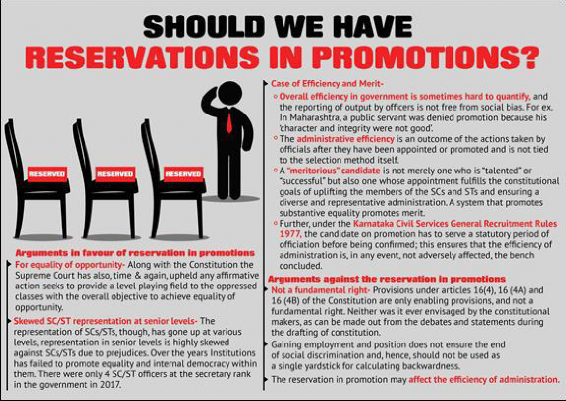6.5.4. Issue of reservation in promotions
Although, the SC in Indira Sawhney Case had held that the reservation policy cannot be extended to promotions, but it was overruled by the 77th Constitutional Amendment Act, 1995. This amendment introduced Article 16(4A), which provided reservation in promotion to SC/STs.
♤ In Ajit Singh vs. State of Punjab, the Supreme Court upheld the validity of 77th amendment act and directed to introduce “catch up rule”. The court restored their seniority once promoted at par with the SC/ST candidates who got quick promotions ahead of their batch mates.
♤ The Parliament again amended the Constitution through the 85th Amendment Act, 2001, to negate the catch up rule directed by Supreme Court. It introduced promotion with consequential seniority. This act was brought with retrospective effect from 1995.
o Consequential Seniority means elevation to a senior position consequential to circumstances, and not through normal rules. Illustrating it, suppose there are 100 sanctioned posts in a department, out of which 30 are occupied by unreserved candidates, 15 are occupied by reserved candidates and 55 remain ‘vacant’. The reservation is 30%, which implies that 30 posts must be manned by reserved category employees. So, if a reserved category employee is junior to a general category employee, but there is vacancy for reserved category at a senior position, so reserved category employee will be considered senior and promoted above the general category employee.
♤ In 2002, Karnataka had brought a similar law, but was struck down by the Supreme Court in 2006 in M. Nagaraj vs. Union of India Case. The Supreme Court validated the state’s decision to extend reservation in promotion for SCs and STs, but gave direction that the state should provide proof on the following three parameters to it-
o Empirical Data on Backwardness- of the class benefitting from the reservation.
o Empirical Data on Inadequate Representation- in the position/service for which reservation in promotion is to be granted.
o Impact on efficiency- how reservations in promotions would further administrative efficiency.
♤ Many stakeholders and petitioners were not satisfied with these criteria and various review petitions were filed on this judgment. It was again taken up in Jarnail Singh Case which upheld the 2nd and 3rd criteria of Nagaraj Case. But observed that there is no longer need to collect quantifiable data on the backwardness of SCs and STs. Although it stated that the exclusion of creamy layer while applying the principle of reservation is justified, even in the case of SCs and STs.
♤ Faculty Association of AIIMS vs. Union of India, July 2013- In this case, a five judge bench of the Supreme Court ruled that there are certain jobs for which merit alone should be the sole criteria.
o The Union Government appealed against this judgment and in the review petition a five-judge bench in January 2014, threw the ball back into the Central Government’s
court saying that the Government was free to amend the Constitution to provide reservation in faculty for superspeciality posts and that the previous judgment did not place any restriction on the Government to decide whether or not there should be reservation in superspeciality posts.
♤ In 2019, the Supreme Court had permitted the Central government for reservation in
promotion to SC/ST employees working in the public sector in “accordance with law”.
♤ The Karnataka government set up the Ratna Prabha Committee to submit a report on the three criteria and based on its report had come up with the revised bill. This time, the court has upheld it constitutionally.

